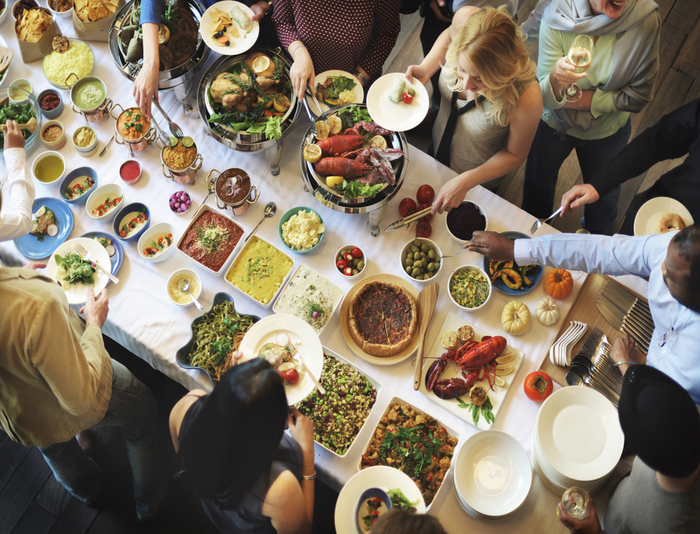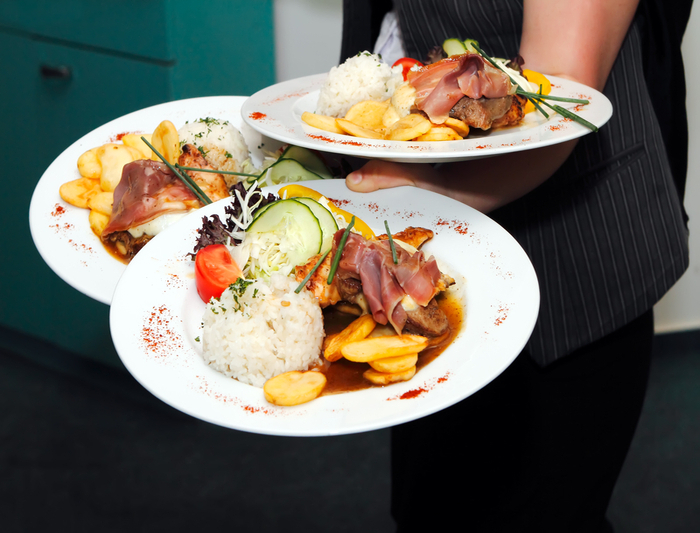- Calls to this hotline are currently being directed to Within Health or Eating Disorder Solutions
- Representatives are standing by 24/7 to help answer your questions
- All calls are confidential and HIPAA compliant
- There is no obligation or cost to call
- Eating Disorder Hope does not receive any commissions or fees dependent upon which provider you select
- Additional treatment providers are located on our directory or samhsa.gov
Food Anxiety and Social Events

Throughout human history, large meals have been an integral part of all kinds of occasions. And today, everything from birthday parties to holidays, weddings, date nights, and professional events may center around the idea of eating with others.
For many, these get-togethers mark a happy occasion. But for individuals dealing with food anxiety, these moments can be fraught with panic and emotional distress.
Body image issues, food aversion, or other food-related anxieties can make social gatherings a triggering and detrimental experience. But with the right kind of support, someone struggling with food anxiety can learn how to better handle—and possibly even enjoy—these situations.
What is Food Anxiety?
Food anxiety is a type of anxiety that manifests as a deep concern over the effects of food on the body. The stress can take many forms, including concerns about calories, weight gain, or being judged by others for what one is eating.
Some people with food anxiety also fear certain food textures, and worry about possible allergic reactions or choking.
When anxiety levels are high enough, it can lead to the avoidance of certain foods altogether. Eventually, this can have a severe impact on someone’s health or overall quality of life. It can be limiting or even dangerous.
What Causes Food Anxiety?
Food anxiety is an aspect of many different eating disorders, but specific concerns about food or eating socially can stem from a number of different places.
Many people experience anxiety around eating in public due to fears of being judged by others, either for the way they look or the food they want to eat. But food anxiety can also happen in private settings, particularly if someone was raised in a household that was critical around certain foods.
Individuals with sensory processing disorders can also struggle with food anxiety and social events. Smells, textures, and even colors can become overwhelming for these people, and make a negative impact on the eating experience.
In some cases, food aversion can be developed after a child has spent some time being fed through a feeding tube, some studies show. [1] And some people with a history of allergic reactions or choking may also learn to fear or avoid certain foods.
Food Anxiety Symptoms
As food anxiety often leads to the avoidance of certain foods, skipping meals, and other disordered eating behavior, it can also play a part in a number of health complications, including: [2]
- Uneasy or churning stomach
- Picky eating that gets progressively worse
- Loss of appetite
- Obsession with body image
- Rapid breathing
- Clamminess or shakiness
- Hypervigilance on nutrition apps or calorie counting
- Mood swings, particularly after eating
But it’s not just someone’s physical health that can be impacted.
As food represents such a central role in so many social events, it can bring someone with severe food anxiety to start self-isolating, which can have a negative effect on emotional and mental health.
Challenges of Social Events When Controlling Food Anxiety
Indeed, attending social events while living with food anxiety can present unique challenges. Some of the biggest concerns for many people with this condition include: [3,4]
- Lack of control: Dining out often involves losing one’s autonomy over food choices. They may not like what’s on the menu or question what the meals were made with. And when they’re invited to a potluck or private party, the array of unknown foods can further increase anxiety.
- Etiquette implications: A guest with food anxiety may feel concerned about hurting the host’s feelings. In many cultures, declining the food a host provides is seen as rude. And worrying about this perception can work to increase anxiety already being experienced.
- Indecision: People with food anxiety may worry about eating something that might cause discomfort or anxiety. There may not be anything on the menu that looks good to them. This can lead to indecision, which can lead to further social anxiety.
- Physical symptoms: Food anxiety can cause a physical response such as nausea, vomiting, and stomach pain, which can be embarrassing or uncomfortable in social situations.
- Dissociation: It can be hard to stay present in a moment while dealing with internal struggles like anxiety. This can lead to a sense of separation or loneliness, which could eventually bring on more mental health concerns.
Tips for Socializing with Food Anxiety
Still, living with food anxiety doesn’t have to mean living without socialization. Indeed, humans are social creatures, and often suffer from a lack of regular contact.
Some tips for dealing with food anxiety in social situations include:
- Talking to the host or event planner beforehand.
- Offering to bring an appetizer or something you are comfortable with eating.
- Bringing a hostess gift, such as flowers or a bottle of wine, to show appreciation and gratitude for the invitation.
- Looking at the menu beforehand, if possible.
- Ordering takeout before the event and trying the item in your home.
- Giving yourself space. Choose a seat at the end of the table and allow yourself to take a walk or get some air if needed.
Managing anxiety is an ongoing task, and it’s not easy. These tips may be able to help alleviate some situations, but if you or someone you know continues to struggle with food anxiety or other disordered eating behavior, you may want to seek out professional help.
Getting Help for Food Anxiety and Social Events
While there is no easy fix for dealing with food anxiety at social events, it is possible to work toward positive change.
Therapy
There is usually a root cause for the anxious response to certain foods. Talking to a mental health professional can help you identify the source of your anxiety and develop strategies for managing it. Looking for therapists with a relevant background in trauma, anxiety, or eating disorders can be particularly helpful.
Loved Ones
You can also ask friends and family for help in social events. Bringing a support person with you when you dine out can help alleviate certain aspects of anxiety. You can also develop a signal, to alert them to your state of mind and have them bring you outside or initiate another type of coping strategy.
Support Groups
Support groups may offer other forums for help. You can speak to those going through similar situations, or share or work on techniques for lowering anxiety.
Most importantly, try to remember that help is available. Anxiety may feel too powerful to beat, but what the mind creates, the mind can also overcome.
Resources
- Oral Eating and Aversions. (2022). Feeding Tube Awareness Foundation. Accessed January 2023.
- Food Anxiety Disorder. (2022). Banyan Treatment Centers. Accessed January 2023.
- Dissociation and dissociative disorders. (2023). Mind. Accessed January 2023.
Anxiety Disorders. (2022). Mayo Clinic. Accessed January 2023.
The opinions and views of our guest contributors are shared to provide a broad perspective of eating disorders. These are not necessarily the views of Eating Disorder Hope, but an effort to offer discussion of various issues by different concerned individuals.
We at Eating Disorder Hope understand that eating disorders result from a combination of environmental and genetic factors. If you or a loved one are suffering from an eating disorder, please know that there is hope for you, and seek immediate professional help.
Published on February 23, 2023 and Reviewed By: Jacquelyn Ekern, MS, LPC
Published on EatingDisorderHope.com

